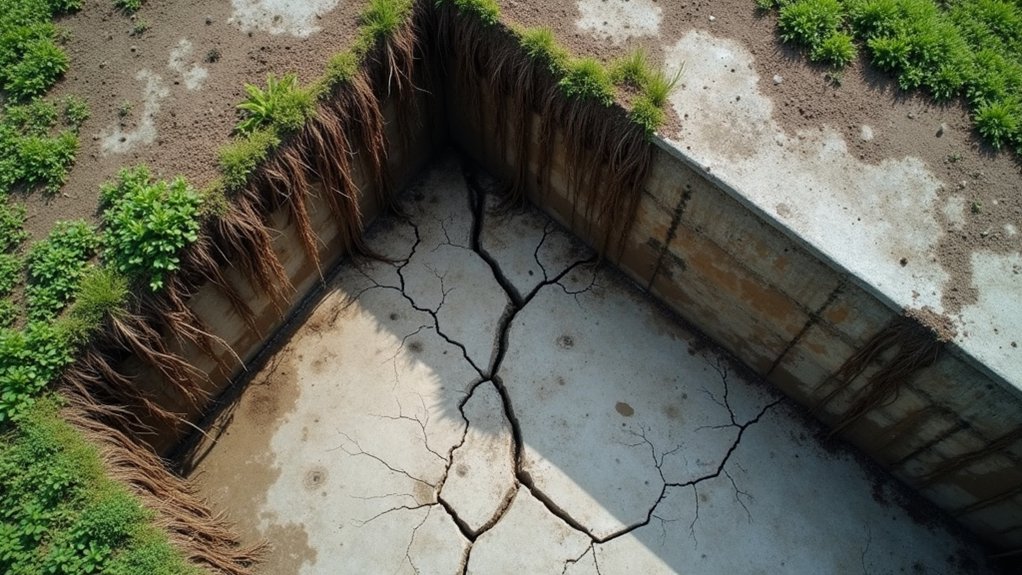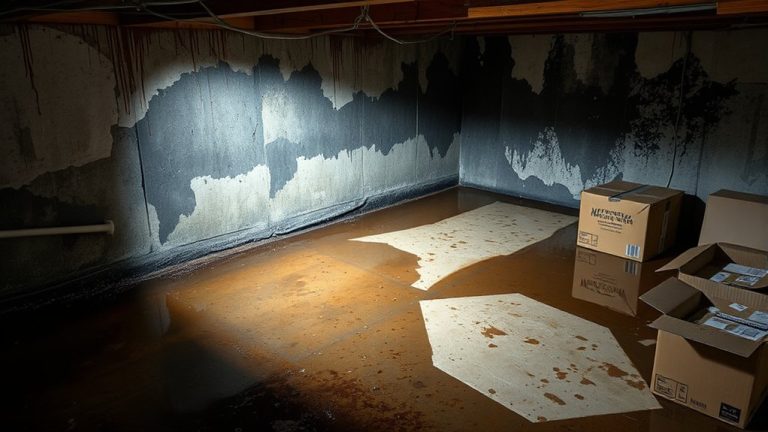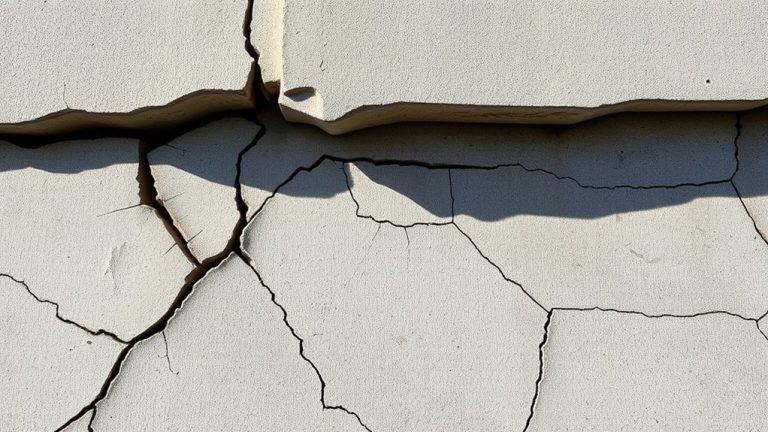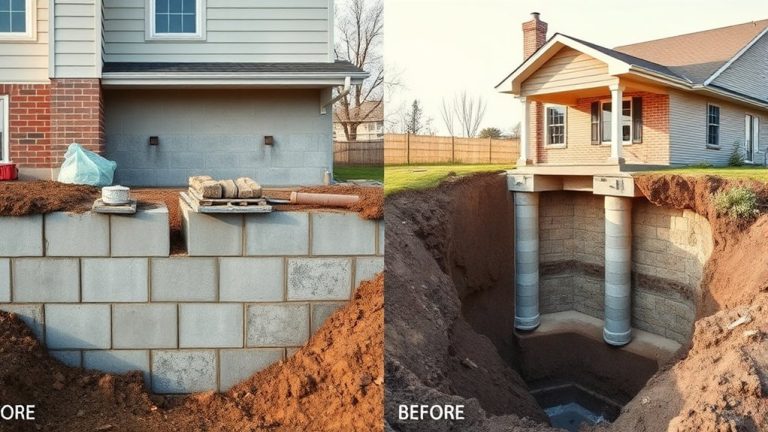Your home's foundation is its silent guardian, but one wrong move can turn it into a ticking time bomb. Unnoticed drainage issues, landscaping mishaps, and ignored warning signs can slowly erode your property's structural integrity. These subtle mistakes might seem insignificant now, but they can lead to catastrophic and costly damage. Want to protect your most precious asset before it's too late?
Key Takeaways
- Neglecting proper water drainage and grading around the property, which can lead to water pooling and potential foundation damage.
- Planting trees or large vegetation too close to the home, causing root intrusion and hydrostatic pressure on foundation structures.
- Ignoring early warning signs of foundation issues like hairline cracks, uneven floors, or sticking doors that indicate structural stress.
- Improperly maintaining soil around the foundation through excessive compaction or using heavy machinery that restricts drainage and root growth.
- Attempting do-it-yourself foundation repairs without professional expertise, which can inadvertently worsen existing structural problems and increase repair costs.
Poor Water Management and Drainage
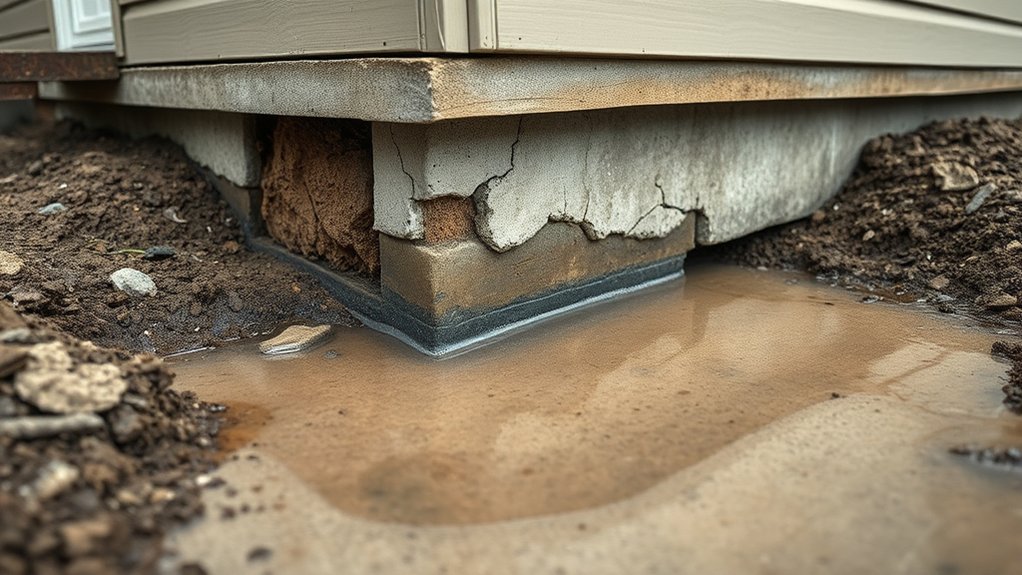
When water isn't properly directed away from your home, it can slowly but surely undermine your foundation's structural integrity. Inadequate grading around your property can cause water to pool near your foundation, creating potential damage. Drain tiles and yard drainage solutions can help prevent water accumulation and protect your foundation from potential water-related issues. You'll want to guarantee your terrain slopes away from your home, allowing rainwater and runoff to move freely without collecting near your foundation. Regular maintenance of your drainage systems can prevent costly repairs and safeguard your home's most critical structural element.
Inappropriate Landscaping Practices
Although homeowners often focus on aesthetic beauty, certain landscaping choices can inadvertently compromise a home's foundation. Planting trees too close to your house can lead to excessive tree growth, with roots spreading underneath and potentially cracking foundation walls. Hydrostatic soil pressure from improper landscaping can cause significant stress on foundation structures, leading to bowing walls and potential structural damage. Inadequate grading around your property can also cause significant drainage issues, allowing water to pool near your home's base. You'll want to confirm your yard slopes away from the foundation, creating natural water runoff. Thoughtful landscaping isn't just about looks—it's about safeguarding your most treasured investment and maintaining structural integrity.
Ignoring Early Signs of Foundation Damage
Just as landscaping can silently impact your home's foundation, foundation problems themselves often begin with subtle, easy-to-miss warning signs that homeowners frequently overlook. Differential soil settlement can cause hairline cracks in walls, uneven floors, and doors that suddenly stick—signals you shouldn't ignore.
These early indicators might seem minor, but they're your foundation's cry for help. Inadequate insulation can also contribute to foundation stress, leading to moisture problems and potential structural damage. Don't wait until small issues become expensive repairs. By paying attention to these warning signs and addressing them promptly, you'll protect your home's structural integrity and save significant money in the long run.
Improper Soil Maintenance Around Your Home
The soil surrounding your home plays an essential role in maintaining your foundation's stability, yet many homeowners unintentionally create conditions that can seriously compromise structural integrity.
Excessive soil compaction around your foundation can prevent proper water drainage and restrict root growth, leading to potential foundation stress. You'll want to avoid heavy machinery near your home's perimeter and confirm adequate soil aeration through strategic landscaping.
DIY Repairs Without Professional Expertise
Many homeowners find themselves tempted by the allure of DIY foundation repairs, believing they can save money by tackling complex structural issues without professional guidance. However, attempting DIY structural modifications without proper skill set can lead to catastrophic consequences.
Inadequate soil testing and uninformed repair techniques might worsen existing foundation problems, potentially causing extensive damage that far exceeds initial repair costs. Professional foundation experts possess specialized knowledge and equipment to accurately diagnose and resolve structural issues.
Your well-intentioned efforts could inadvertently compromise your home's structural integrity, creating long-term, expensive complications.
Neglecting Regular Foundation Inspections
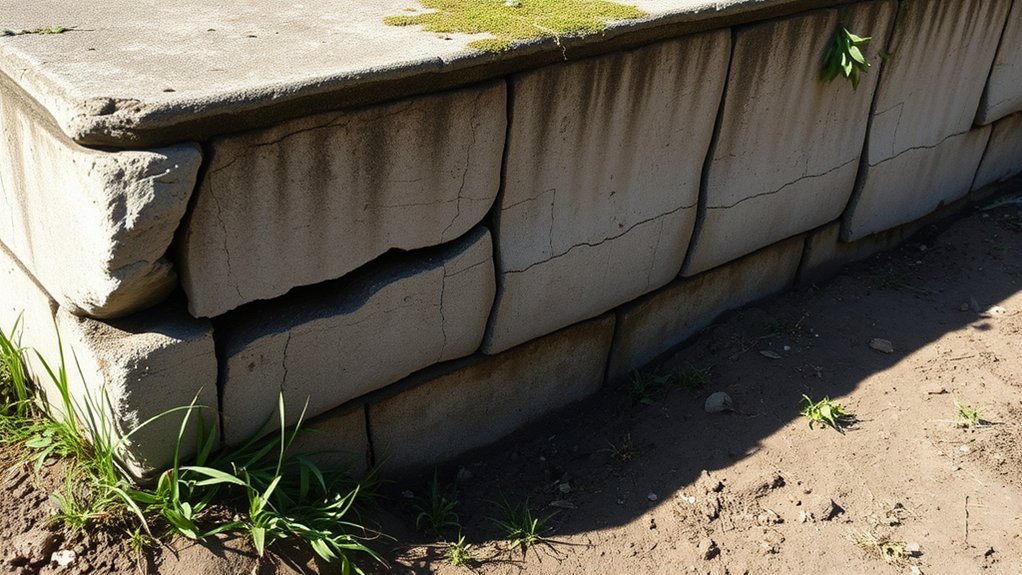
Homeowners often overlook the critical importance of periodic foundation inspections, inadvertently setting themselves up for potential structural nightmares. By skipping regular assessments, you're gambling with your home's most fundamental support system.
Professional periodic inspections can detect early signs of foundation damage, preventing costly repairs down the line. These structural integrity checks help you catch minor issues before they become major problems, saving you thousands in potential repair costs.
Don't wait until cracks appear or floors become uneven—schedule routine inspections and protect your most cherished investment.
Frequently Asked Questions
Can Small Foundation Cracks Mean Serious Structural Problems?
Small foundation cracks can signal serious structural issues. You'll want to identify minor versus major cracks, checking common causes like soil settlement, water pressure, and concrete shrinkage to prevent potential damage.
How Quickly Do Foundation Issues Worsen if Left Untreated?
If you ignore foundation issues, gradual deterioration and accumulating settlement can rapidly accelerate damage. You'll risk exponential structural compromise, potentially altering, changing, or remaking minor cracks into devastating foundation failures within months.
What Are the Most Expensive Foundation Repair Techniques?
You'll face steep costs with complex [foundation] methods and slab jacking techniques, which can range from $5,000 to $30,000, depending on your home's structural damage and repair requirements.
Does Homeowners Insurance Typically Cover Foundation Damage Repairs?
Your homeowners insurance likely won't cover foundation damage unless it's sudden and accidental. You'll need to traverse the claim process carefully, understanding your specific policy coverage's limitations.
When Should I Hire a Structural Engineer for Foundation Concerns?
You'll want a structural engineer if you notice significant foundation cracks, uneven floors, or persistent moisture issues. Periodic inspections and proactive maintenance help catch potential problems before they escalate.
